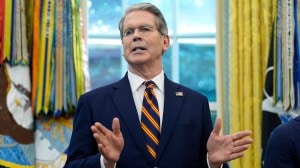If Delhi doesn’t think out of its box, C in Saarc may end up standing for China
As China raises its economic profile in the subcontinent—from Gwadar on the Makran coast of Pakistan to Cox’s Bazaar in the south ...

As China raises its economic profile in the subcontinent—from Gwadar on the Makran coast of Pakistan to Cox’s Bazaar in the south east of Bangladesh, and the Himalayan Kingdom of Nepal to Sri Lanka and Maldives in the Indian Ocean-India seems stuck in a policy limbo.
Wen Jiabao’s visits to Pakistan, Bangladesh and Sri Lanka, on the eve of his arrival in India tomorrow signal Beijing’s determination to deepen its engagement with the subcontinent. India’s neighbours, naturally, will not miss the opportunity to play the China card.
Unless it wakes up to the long-term impact of China’s new policy initiatives in South Asia, India will find itself an increasingly irate spectator in its own region.
In Islamabad, Wen signed a new treaty of peace and friendship solidifying “all weather partnership” with Pakistan. In Dhaka, Wen announced the agreement to develop “comprehensive and cooperative partnership” with Bangladesh.
In Pakistan, Wen announced additional assistance to the Chashma nuclear plant Pakistan. In Bangladesh he signed a new agreement for cooperation in peaceful uses of nuclear energy.
Wen had to cancel his visit to Gwadar port to mark the completion of the first phase of the deep-water port built with Chinese assistance at the mouth of the Persian Gulf. But reports from Islamabad say China has now acquired long-term access rights to Gwadar and Karachi ports.
In Bangladesh, Wen’s discussions included the establishment of air links between Dhaka and Kunming and the creation of new road corridors that will link southwestern China with Cox’s Bazaar through Myanmar.
In Colombo, Wen will sign many agreements including one to develop infrastructure in tsunami-ravaged Sri Lanka.
|
CCS meets on visit eve
|
|||||
|
• On Wen visit eve, PM chairs meeting of CCS to take stock of issues |
|||||
While Wen has skipped Maldives, reports say China has plans to develop a few islands in the strategically located Maldives.
Wen avoided going to Nepal, but his foreign minister was there earlier this month. King Gyanendra, whom India did not want to meet at the SAARC summit in Dhaka, will soon be heading to Beijing on a state visit.
China is also expanding its trans-Himalayan transport infrastructure with Nepal and on the borders of Bhutan, with which it does not yet have diplomatic relations.
To put China’s expanding strategic economic profile in perspective, the world’s third largest economy cannot be expected to stay out of the subcontinent, particularly when it is a neighbour.
It is also inevitable that some of China’s projects—like the Gwadar port in Pakistan or the six new highways it wants to develop between Nepal and Tibet—will have long-term strategic consequences. It is neither desirable nor feasible for India to try and prevent this growing economic influence in South Asia. Crying foul is not going to help.
India has limited options in dealing with the rising Chinese profile in the subcontinent. The first is to radically revamp New Delhi’s trade policy to the neighbours. While China has aligned its foreign economic policy with the strategic imperatives of geography, India remains tight-fisted and plays for small stakes.
If India can’t find ways to integrate itself with the economies of our neighbours, China will. Don’t blame Beijing for Delhi’s lack of vision.
Second, as China begins to penetrate the physical space of India’s neighbourhood through new transport corridors, New Delhi needs to quickly transform its own border infrastructure and strengthen connectivity with the neighbours.
Third, India must reconsider its reluctance to work with China in promoting regional economic integration in South Asia and the abutting regions. Instead of avoiding Chinese initiatives in the region, New Delhi should shape them through its own participation.
Fourth, the talk of strategic partnership between India and China will remain empty until the two sides agree to talk about their shared neigbourhood. Like with the US, India needs an official framework for discussion of South Asian regional security issues with Beijing.
Finally, Prime Minister Manmohan Singh would want to find out from Wen why Beijing, so keen on building a strategic partnership with New Delhi, is reluctant to let India into other regional forums like the Shanghai Cooperation Organisation and the East Asia Summit.
As friends India and China must find ways to honestly discuss problem areas in their bilateral relations. Skirting them will only feed mutual grievances and suspicions from another era.
Photos





- 01
- 02
- 03
- 04
- 05


























